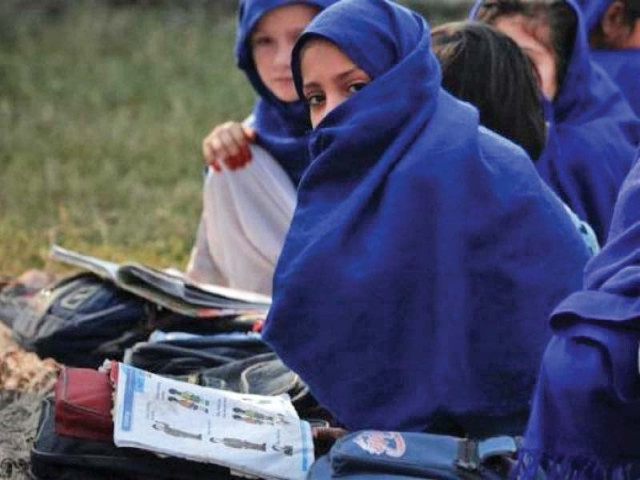Bribery incidence in Pakistan much higher than rest of South Asia
Infant mortality in Pakistan stands at 66 per 1,000 births, one of the highest in Asia

Infant mortality in Pakistan stands at 66 per 1,000 births, one of the highest in Asia and primary education completion rate, especially for the female population, remains abysmally poor. PHOTO: REUTERS
This time, however, the issue is of a global scale. The Panama Papers have exposed how corporate vehicles can be used as a means to hide illegal behaviour including corruption and tax evasion.
But what is corruption? International organisations such as the World Bank and Transparency International have defined corruption as “the abuse of public office for private gain”. This includes within its domain gains which may not result in monetary benefits.
Pakistan's laws facilitate money laundering, tax evasion
The global issue
Corruption is an issue which affects advanced economies and developing countries alike. In a global environment of rising inequality and slowing growth, corruption has attracted greater attention and has caused moral outrage that the rich are abusing their power for their advantage.
Transparency International’s Corruption Perceptions Index for 2015 ranks countries in northern Europe (Denmark, Finland, Sweden, the Netherlands and Norway) as some of the least corrupt in the world. Interestingly, however, being one of the least corrupt nations at home does not guarantee a clean record overseas.

The recent Anti Corruption Summit held on May 12, 2016 in London discussed some of the biggest corruption problems globally, including secrecy of the movement of corrupt money around the world. This was the first of its kind summit which brought together leaders from more than 40 countries to discuss corruption in a transparent and inclusive manner. All the participant countries signed to general principles and some made specific country commitments.
How does corruption affect economies?
Corrupt behaviour leads to suboptimal economic performance. A recent estimate by the IMF puts the cost of bribery at about $1.5 to $2 trillion which is roughly 2% of global GDP.
Will not accuse but arrest the corrupt when in power, Imran tells Nawaz
Corruption breeds distrust of the government and weakens the state’s capacity to perform its core functions. Corruption also has detrimental effects on macro-financial stability, efficiency of public and private investment and expenditure on human capital growth such as education and health. This hurts inclusive growth of the economy and breeds inequality which has the effect of inducing political instability and conflict.
IMF studies have also pointed to the weakening ability of the government to collect tax revenue in the presence of corruption. Moreover, wasteful public spending combined with lower revenue base results in large fiscal deficits and substantial debt accumulation.
Corruption can also distort selection of public investment projects through bribery and rent-seeking. Developing countries including Pakistan have at some level been adversely affected by the implications that corruption causes.
The Pakistani perspective
The World Bank’s Enterprise Survey has been collecting data from face-to-face interviews with top managers and business owners in over 130,000 companies in 135 countries. Amongst other variables, it also collected data on different variables to determine the extent of corruption in the society.
According to data from 2013, the extent of bribery incidence in Pakistan is much higher than the South Asian average. The survey shows that 88% of the firms are expected to give gifts to secure government contracts relative to the South Asian average of 45.5%. Overall, 68% of the firms see corruption as a major constraint compared to almost 40% of the firms in the South Asian average.
PTI will steer campaign against corruption 'till the end', says Imran
The perception of rampant corruption in the country is also validated by Transparency International’s Corruption Perceptions Index for 2015 which has ranked Pakistan at 117 out of 168 countries.
Fighting corruption
Corruption is a pervasive issue that affects more than 6 billion people worldwide. It adversely hampers capacity of the government on issues that matter the most to the public – improvement of human capital including education and health.
Pakistan’s performance on these two fronts is glaring: infant mortality stands at 66 per 1,000 births, one of the highest in Asia and primary education completion rate, especially for the female population, remains abysmally poor.
Introducing reforms to the existing governance structure and anti-corruption strategies cannot be credible unless they are implemented by effective institutions. Perhaps at the heart of this entire debate is the realisation that there is no way to fight systemic corruption unless there is a motivation to change behaviours and social values at the individual level.
The writer is an economist and ex-central banker
Published in The Express Tribune, May 23rd, 2016.
Like Business on Facebook, follow @TribuneBiz on Twitter to stay informed and join in the conversation.



















COMMENTS
Comments are moderated and generally will be posted if they are on-topic and not abusive.
For more information, please see our Comments FAQ